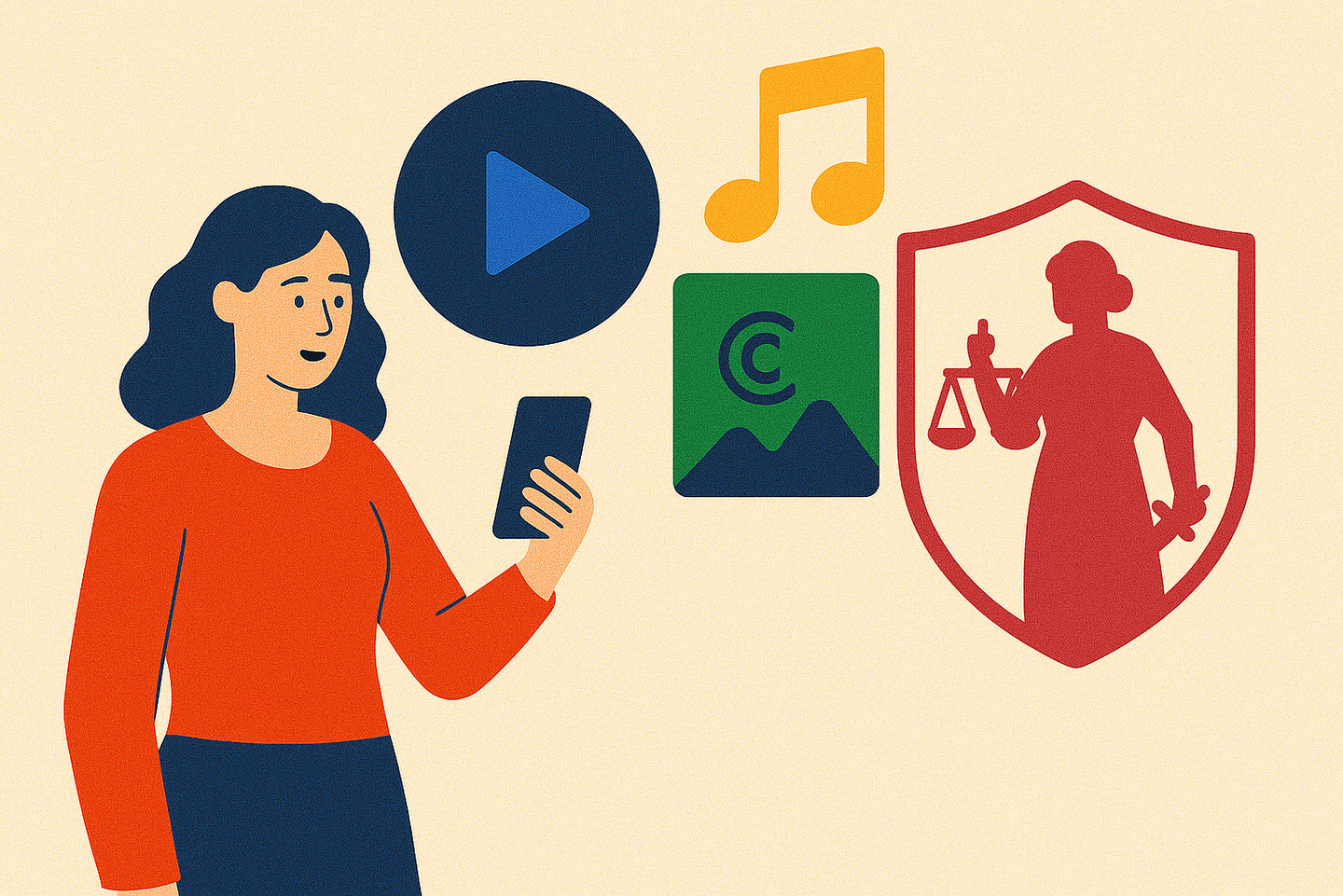Can Influencers Be Sued for Using Copyrighted Music or Images in Reels?
This article emphasizes the importance of copyright laws, guiding digital creators to stay compliant and avoid legal issues in today's online landscape. .
IPR
Prajul Mehta
6/20/20253 min read


In this digital era, some people have the ability to connect with millions of people in a matter of seconds and influence their opinions, consumption patterns, and trends. These people are called influencers, and they are the powerhouse of this fast-paced world of social media, but their power is regulated via certain copyright law, licensing requirements, and platform policies.
Platforms such as Instagram and TikTok offer creative freedom to these influencers to showcase their ideals, creativity, or opinions with the help of short, eye-catching videos that contain dynamic imagery and trending sounds. While making use of this creative freedom, many influencers overlook certain laws and find themselves caught in the legal minefields of this digital universe.
Understanding what a copyright is
Copyright is the legal right granted to the people who create original works of authorship. It provides exclusive rights to use, replicate, display, or distribute their work publicly. These rights are automatically granted upon creation, meaning no registration or anything is necessary for the protection of their creations and innovations.
There are times when many influencers use copyrighted sounds or imagery in their content without any proper licensing or permission. such events may constitute copyright infringement and can result in multiple lawsuits, monetary penalties, and even a notice for account takedown. Although the use of copyrighted content may seem harmless but from a legal point of view, unauthorized use of someone else’s intellectual property is considered a serious violation.
Reels and the Rise of Copyright Issues
TikTok’s Reels and other short video content are often drafted in such a manner that they are quick, appealing, and with eye-catching visuals. Most of these videos make use of popular music, clips from famous movies, or aesthetically pleasing photographs. However, a majority of influencers use such copyrighted content without understanding its legal implications.
Here’s a common scenario: An influencer drafts a TikTok video with a popular track playing in the background and overlaying high-resolution copyrighted imagery, which they might have found on the internet or over a different platform, such as Pinterest etc. If any content(s) from this draft is copyrighted and used without complete permission and licenses, then that influencer, regardless of their content being monetized or not, may be infringing copyright laws and can lead to a full-scale lawsuit against them.
Can Influencers Be Sued?
Yes, influencers can be sued for copyright infringement, though there are several factors that determine the likelihood of that happening:
Legal Standing of the Copyright Owner:
The owner or someone who has been granted the right to the content is the valid person to file a lawsuit
Scale and Impact:
A macro influencer with millions of followers who uses copyrighted content is more likely to grab legal attention with their work as compared to a small-time influencer with little to no following using copyrighted content.
Intent and Commercial Use:
If the copyrighted content is used to enhance the appeal and promote a commercial product or service, it is more likely to be accepted as a case of copyright infringement.
Platform Policies:
Different platforms have different systems to detect any unauthorized content and to remove or suspend the user for using copyrighted content that does not comply with their copyright laws.
How to Avoid Copyright Issues
Create Original Content:
The safest way is to create your own photographs, clips, and use either royalty-free or self-composed sounds.
Get Written Permission:
If you find any imagery or any piece of music that you feel like using, reach out to the creators first for their written permission.
Use Licensed Music and Images:
Most social media platforms come with their own libraries of royalty-free or licensed soundtracks. If you stick to using those options for your personal use and not for commercial promotion.
Give Credit (but Know It’s Not Enough):
Most influencers just give credit to the original creator and assume that’s enough to avoid any legal trouble. While giving credit is ethically important but proper licensing is important.
The Role of “Fair Use”
Many influencers believe that their way of using copyrighted content is considered a fair use- a doctrine that allows use of copyrighted content without permission in a restricted limit for purposes such as criticism, education, parody, or news reporting. Fair use is considered a legal defence and not a right.
This is determined by numerous factors:
The purpose and character of the use (commercial vs. educational)
The nature of the copyrighted work
The amount and substantiality of the portion used
The effect of the use on the potential market for the original
The majority of content from influencers, mainly promotional or branded posts, fails to meet the qualification criteria of fair use.
In Conclusion, there’s a fine line between creativity and legality when it comes to making content on social media. As the economy for social media marketing and the number of influencers continues to grow, the scrutiny around the creation and distribution of content grows too. Influencers should educate themselves and become familiar with the copyright and licensing laws of their particular platforms. As “Going viral” is not a pass for infringement.
